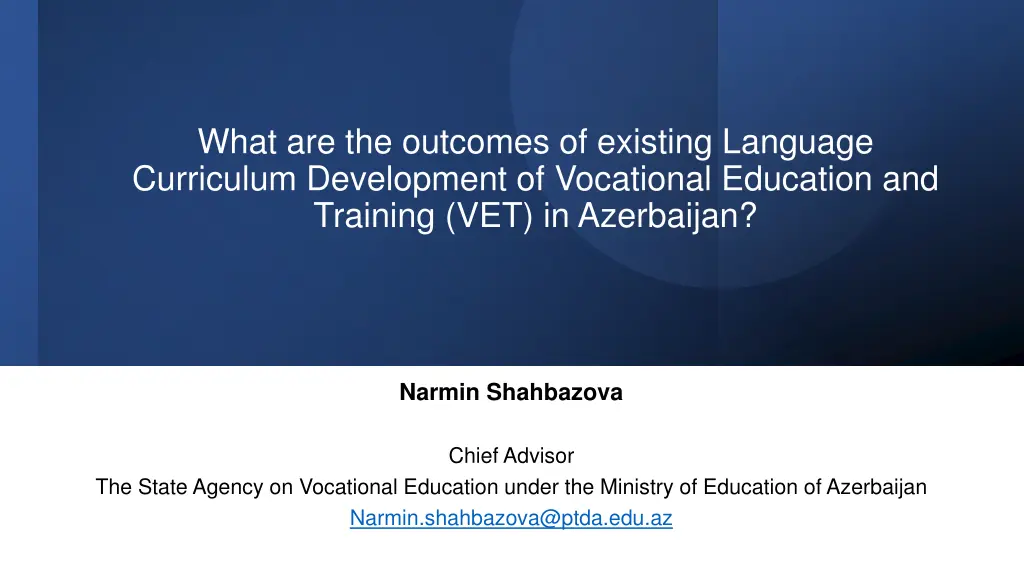
Outcomes of Language Curriculum Development in Vocational Education and Training in Azerbaijan
Explore the outcomes of Language Curriculum Development in Vocational Education and Training (VET) in Azerbaijan from the perspective of introducing international standards. The study, led by Narmin Shahbazova, aims to analyze the impact of existing curriculum development on VET schools and compare them with global standards. It delves into the Human Capital Theory, literature reviews on needs assessment, instructional models, and more to improve human capital development for a skilled workforce.
Download Presentation

Please find below an Image/Link to download the presentation.
The content on the website is provided AS IS for your information and personal use only. It may not be sold, licensed, or shared on other websites without obtaining consent from the author. If you encounter any issues during the download, it is possible that the publisher has removed the file from their server.
You are allowed to download the files provided on this website for personal or commercial use, subject to the condition that they are used lawfully. All files are the property of their respective owners.
The content on the website is provided AS IS for your information and personal use only. It may not be sold, licensed, or shared on other websites without obtaining consent from the author.
E N D
Presentation Transcript
What are the outcomes of existing Language Curriculum Development of Vocational Education and Training (VET) in Azerbaijan? Narmin Shahbazova Chief Advisor The State Agency on Vocational Education under the Ministry of Education of Azerbaijan Narmin.shahbazova@ptda.edu.az
Being a co-author of the Communication in Foreign language base module To assess its outcomes as a focus of evaluation during implementation Rationale for Rationale for the study the study the pilot
This study aims to explore the outcomes of the existing Language Curriculum development in the field of VET system in Azerbaijan and analyse from the perspective Introduction of international Language Curriculum development standards
Research questions What are the outcomes of the existing Language Curriculum Development on the VET schools? What are the worldwide standards in Language Curriculum Development?
The Human Capital Theory Theoretical framework The study investigates language curriculum development impact in the field of Vocational education which aims to improve human capital development for creating skilled workforce in the labour market (Wallenborn, 2010).
Literature review Needs assessment (questionnaires, focus group and individual interviews) before starting language development process in order to identify learners needs, preferably, linguistic needs and finding ways to teach the needed skills (Ulla & Winitkun, 2017). Instructional models for instructors having considered the needs of learners as well as goals of the programme (labour market, studying abroad) (Matsuda and Friedrich, 2011). Inclusion of learners present knowledge in target language during the Language curriculum development process (Nation & Macalister, 2010). Setting communication requirements such as reading, speaking and writing in target language (Diffey, 1992. p.209). Students should be grouped according to their current knowledge on the subject (Mikayilova & Kazimzade, 2015; Diffey, 1992). Student motivation, assessment process (Mikayilova & Kazimzade, 2015).
Methodology and research design Interviews Observations
Methodology and research design 2 4 Teachers 2 Student groups 4
Results from interviews and observations Results from interviews and observations Implementation of the module Students prior English language competency Module assessment criteria Student motivation of learning foreign language Language of instruction
Conducting needs assessment as a starting point of Language Curriculum Development Students should be grouped according to prior knowledge Discussion and Discussion and conclusion conclusion Speaking in target language in classes Student motivation Assessment procedure
Limitation of the study Limitation of the study Qualitative data has been collected Two pilot VET schools, four teachers and two student group observations Generalization of the data
Future implications Future implications Training of teachers to focus on increasing language competency Guidance on how to implement a programme with fidelity Learners linguistic needs
